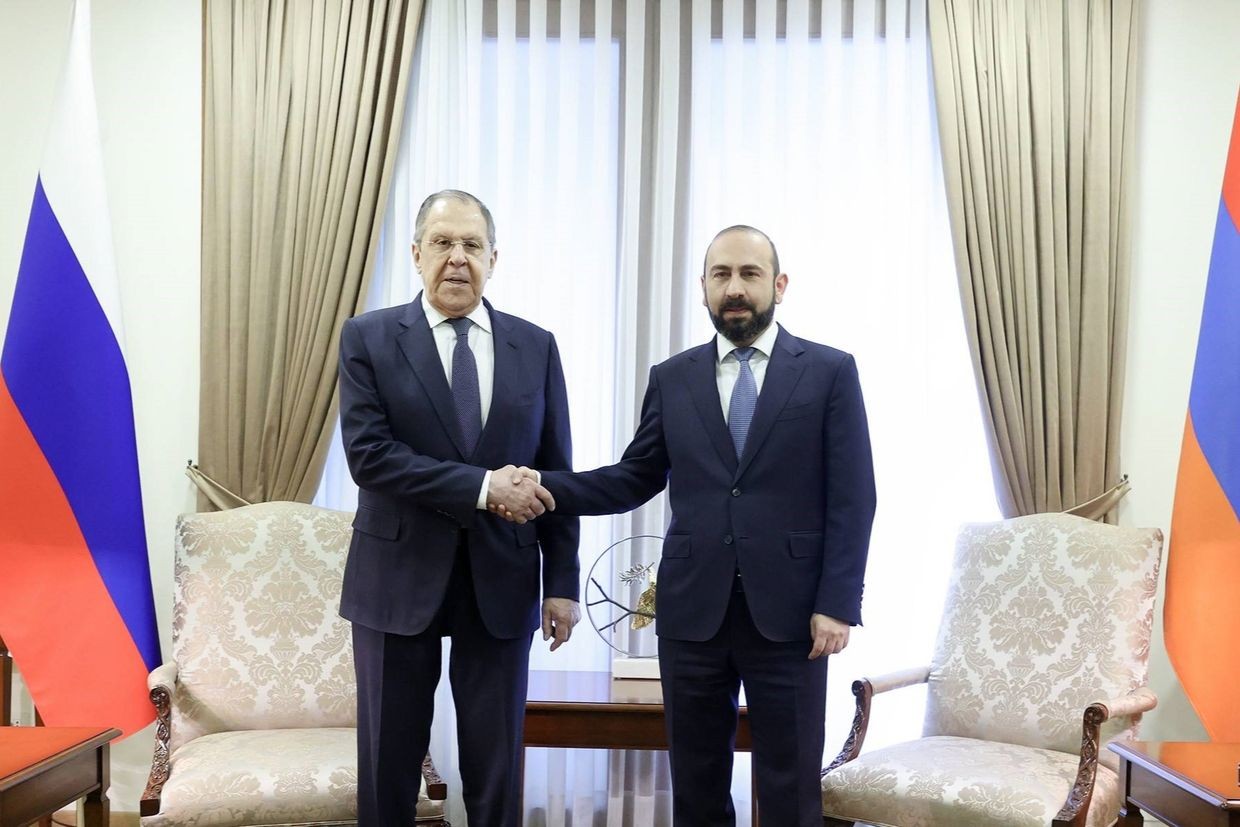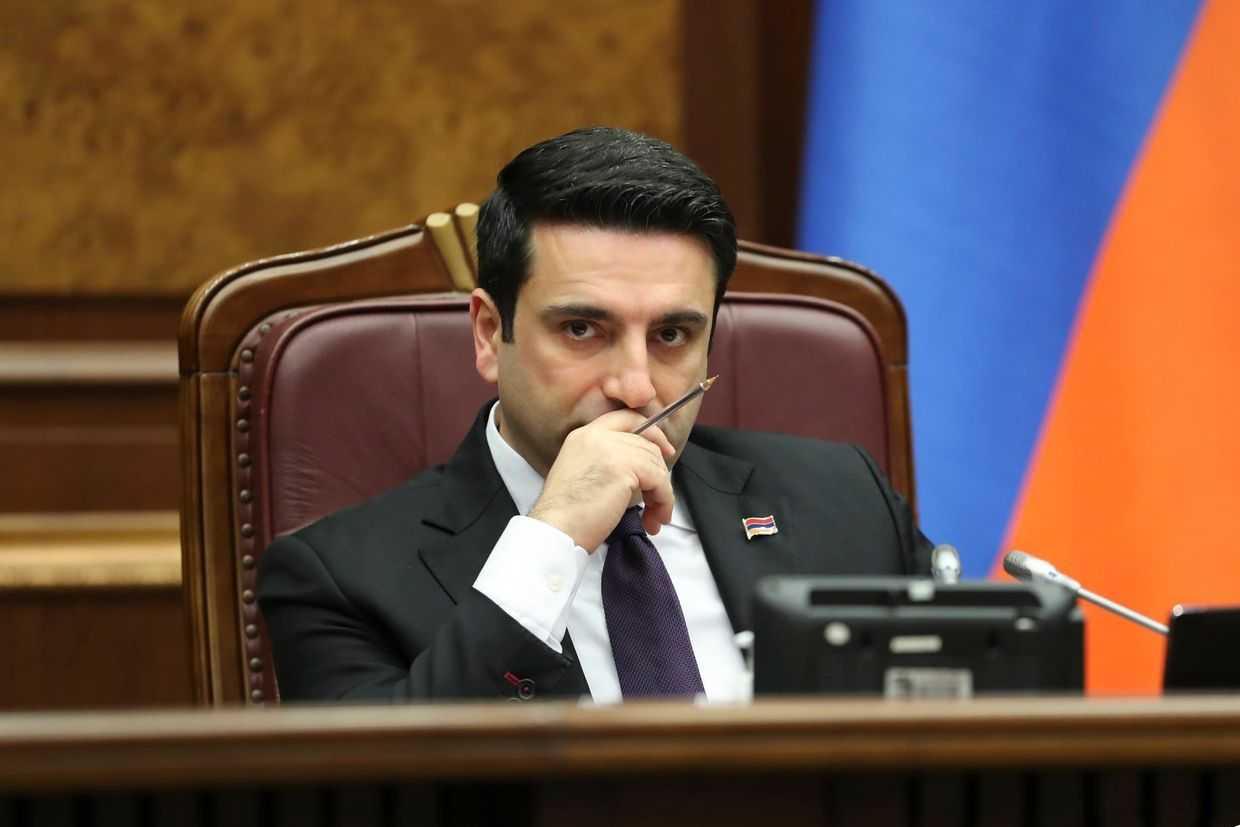
Russia’s Foreign Minister Sergei Lavrov has said that he sees no reason for the ‘Ukrainisation’ of Armenia, following a meeting with his Armenian counterpart Ararat Mirzoyan in Yerevan.
During a joint press conference following the meeting in which the two several times disagreed, Lavrov said there was ‘no need’ for the ‘Ukrainisation’ of Armenia, as it remained a Russian ally.
‘Armenia is our ally, our friend, Armenia does not outlaw the Russian language and Russian culture, does not deprive ethnic Russians and those who simply want to speak Russian of their legal rights’, he said.
Lavrov arrived in Yerevan on Tuesday evening where he was met by a small number of protesters. Ahead of his visit, the pro-Western opposition party For the Republic displayed a poster on Yerevan’s Kyiv Bridge depicting Russian President Vladimir Putin in handcuffs and the word ‘killer’ written in Armenian, Russian, and English. A similar poster was also displayed near the Russian Embassy in Armenia.
Armenian Interior Ministry spokesperson Narek Sargsyan stated later that day that police had removed all the posters ahead of Lavrov’s visit.
The Russian state-run media agency TASS separately reported that activists attempting to disrupt Lavrov’s visit accidentally staged a protest in front of Iranian Defence Minister Aziz Nasirzadeh’s motorcade.
Mirzoyan and Lavrov held an expanded meeting behind closed doors, where the Armenian foreign minister was quoted as saying that he reaffirms Armenia’s ‘readiness to continue effective political dialogue and mutually beneficial cooperation in accordance with the interests of our people and both states’.
Armenia’s rocky alliance with Russia and the CSTO
In their joint press conference following the meeting, Mirzoyan and Lavrov touched on a variety of issues pertaining to Armenia’s rocky relationship with Russia, the Collective Security Treaty Organisation (CSTO), and Russia’s provision of arms to Armenia and Azerbaijan.
During the briefing, a Russian reporter asked Mirzoyan about statements he made about ‘reformatting’ relations with Russia.
Mirzoyan denied that Armenia was preparing to ‘reformat [its] allied relations with Russia’.
‘Our obligations, rights and our intentions towards each other are clearly written on paper, signed, ratified, and no one has dissolved them’, he added.
He separated this from Armenian relations with the CSTO, which he Armenia was ‘not satisfied’ with. The CSTO is a Russia-led military alliance whose charter stipulates that members of the security bloc are obliged to mutually defend each other against external threats or attacks.
Yerevan announced in early February that it was ‘freezing’ its participation in the bloc for its failure to come to Armenia’s defence.
A reporter from Armenpress asked Lavrov why Russia did not ‘respond adequately’ in the face of Azerbaijan’s attack on Armenia in September 2022.
In response, Lavrov said that he did not know what the reporter ‘meant by an adequate response’, but said that Russia responded immediately via the CSTO.
‘The CSTO fact-finding mission went to the scene to familiarise itself with the situation, presented an operational report with specific and practical recommendations that a CSTO observer mission should be sent there to stabilise the situation’, he said.
He went on to say that there was a ‘gentleman’s agreement’ that the Nagorno-Karabakh issue would be ‘subject to further coordination’ between Armenia and Azerbaijan.
Mirzoyan chimed in saying that this was ‘one of those cases’ where Armenia and Russia had differing interpretations of events.
‘The attack in the direction of Jermuk [in September 2022] is just such an issue, and that event was a cornerstone for further developments and positions, including in the context of freezing our CSTO membership.’
Mirzoyan said that Yerevan informed Moscow and other allies in the CSTO about the attack, but ‘the actions that followed were not satisfactory for Armenia’.
According to Armenpress, Mirzoyan stated that Armenia’s position on Nagorno-Karabakh ‘has not been shared by any international partner for years’, noting that Russia recognised that Nagorno-Karabakh was part of Azerbaijan.
‘Armenia does not dispute this approach’, he added. ‘I would like to take this opportunity to say again that Armenia recognises the territorial integrity of Azerbaijan on the basis of the Alma-Ata Declaration, and naturally, expects and has received assurances from Azerbaijan on the recognition of Armenia's territorial integrity, again on the basis of the Alma-Ata Declaration’, he said.
In response to a question about the use of Russian weapons in its final attack on Nagorno-Karabakh in September 2023, the Russian foreign minister said ‘there are also Russian weapons in Mozambique — there is a Kalashnikov assault rifle on their coat of arms’.
Lavrov was also asked about delays to the delivery of Russian weapons purchased by Armenia, stating the issue had been settled.
‘As for new supplies, we have a situation where we are fighting against the whole of Europe’, Lavrov said. ‘Russia needs weapons in the war against Ukraine, and in such conditions, our Armenian partners, I think, understand that we cannot fulfill all obligations on time.’
Lavrov also touched on Armenia’s purchase of weapons from other countries. Armenpress noted that Lavrov had ‘ironically’ said that it was Armenia’s prerogative to do so.
‘No problem, that’s up to our Armenian friends, if they want to have a French or any other country’s base in exchange for extra supplies, so be it, we will not impose anything’, he said.
‘But of course, when an ally relies on a country like France, whose president and all ministers simply breathe hatred towards Russia, which leads the hostile camp against Russia… our allies themselves must decide where to buy weapons, even with everything I said’, he continued, according to CivilNet.
Lavrov also said that Russia considered the presence of its military base in Armenia ‘an important component for guaranteeing the country's security interests’, and that Moscow was interested in restoring Yerevan’s CSTO membership.
Russia ready to support Yerevan and Baku in ‘achieving full peace’
During Wednesday’s discussions, Lavrov also touched upon the Armenia–Azerbaijan peace process, which has stalled since the treaty’s text was ostensibly agreed upon by both states on 13 March.
‘You can always count on our support in terms of communication, as well as in the delimitation of the Armenian-Azerbaijani border and in resolving humanitarian issues, taking into account the interests of all parties’, he reportedly said during the one-on-one meeting with Mirzoyan.
‘Russia is ready to continue to support Yerevan and Baku in achieving full peace and agreement in the future by signing a peace treaty, then also by unblocking economic and transport infrastructure and demarcating the state border’, Lavrov similarly stated during the joint press conference with Mirzoyan.
He paid particular attention to the 3+3 regional cooperation format, which envisions cooperation between all three South Caucasus countries and their three major neighbours — Russia, Turkey, and Iran. Georgia has refused to participate in any such meetings, however.
According to Lavrov, the platform could become an ‘important pillar’ for connecting the countries of the region, with Russia ready to support the process to host the next events in Yerevan and Baku.
Lavrov’s visit to Yerevan came amidst an apparent thaw in Armenian–Russian relations, which had significantly deteriorated following the Second Nagorno-Karabakh War.










